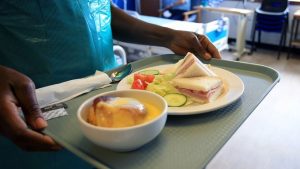I wrote a letter to the hospital in Brisbane where my friend has been holed up, complaining about serving sandwiches with raw sprouts to sick people – or anyone.
 There was some totally unscientific answer about how these sprouts were special because they came from a different place and they disappeared from the sick persons menu for a few weeks.
There was some totally unscientific answer about how these sprouts were special because they came from a different place and they disappeared from the sick persons menu for a few weeks.
The sprouts are now back.
Nothing new, food hygiene reports obtained by the Press Association under the UK Freedom of Information Act and data from the UK Food Standards Agency (FSA) concluded that dirty hospitals are serving out-of-date food to patients.
Meals are being prepared in mouldy kitchens, putting vulnerable patients at “high risk” of food poisoning, while others have unclean worktops, food trolleys and sinks.
FSA data also revealed poor rankings for hundreds of care homes and children’s nurseries.
Some 400 hospitals, hospices, care homes, nurseries and school clubs are currently listed as needing “major”, “urgent” or “necessary” improvement.
One care home was infested with cockroaches while another had evidence of rats.
The Patients Association has called the findings “shameful” and “immensely worrying”.
The Food Hygiene Rating Scheme – which rates organisations and businesses from zero to five – is run by the FSA and councils in England, Wales and Northern Ireland.
The investigation found:
Eight health and care premises currently have a zero rating – which means urgent improvement is necessary. None are hospitals.
Some 187 have a rating of one – which means major improvement is necessary. Three of these are hospital premises, including the private Priory Hospital in Altrincham, Cheshire (because in the UK, like its bastard child, Australia, private is considered better, except when it comes to the basics)..
 And 205 are ranked as two – improvement necessary. They include six hospitals and about 100 care homes. Among those given the ranking of two was Glenfield Hospital in Leicester.
And 205 are ranked as two – improvement necessary. They include six hospitals and about 100 care homes. Among those given the ranking of two was Glenfield Hospital in Leicester.
At Glenfield Hospital in Leicester, an inspection of its kitchens serving patients found:
Sliced chicken two days past its use-by date (hello, Listeria?).
Staff had created their own date labels for when they thought food should be used, creating a “high risk” for patients who might develop food poisoning (food fraud)).
The experts also found leaking sinks, “inadequate” knowledge among staff about how to handle food safely, and mouldy areas, including the salad preparation room.
Food was being kept in fridges with temperatures up to 13C despite rules saying they should be 5C or below to prevent bacteria developing.
Darryn Kerr, director of facilities at Leicester’s Hospitals, said the organisation was “disappointed” by the ratings.
He said catering services were brought back in-house in May after being run by an external provider.
Parkview Residential Care Home in Bexleyheath, south-east London, was found to have an “infestation of Oriental cockroaches” during an August inspection.
The kitchen was closed voluntarily for the second time following a previous warning and inspectors gave it a zero rating.
Ivy House care home in Derby, which specialises in dementia care, scored zero after inspectors found evidence of rat activity.
 Great British Bake Off judge Prue Leith (right) will advise the Government review into bedside meals, amid growing criticism of patients’ food.
Great British Bake Off judge Prue Leith (right) will advise the Government review into bedside meals, amid growing criticism of patients’ food.








